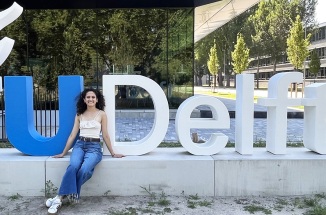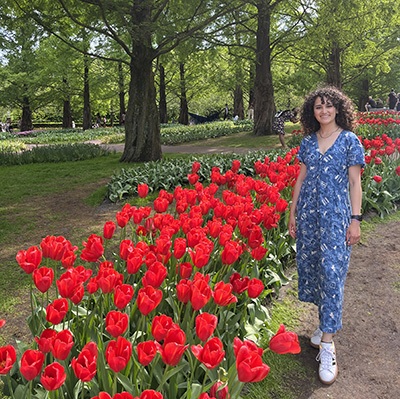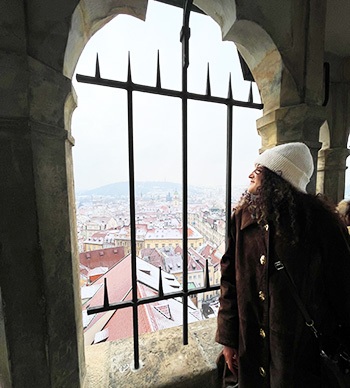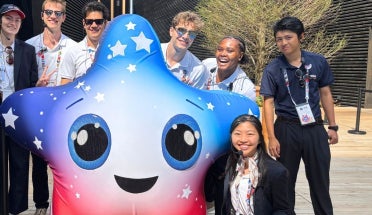
First-Gen Studies in France, Netherlands, Denmark for Career in Biomechanical Engineering
- Apr 5, 2023
- Education Abroad
- by Ellen Stader
Senior mechanical engineering major Jacqueline (Jackie) Villalobos is a first-generation student at The University of Texas at Austin who has played many roles during her journey in international education — hesitant skeptic, nervous newbie and, finally, seasoned pro. After embarking on study abroad experiences in three countries outside the United States, Villalobos is building her engineering career on foundations that stretch across the globe.
She credits much of her engagement abroad to the support and guidance of mentors at UT Austin, especially in the International Engineering Education (IEE) unit at the Cockrell School of Engineering. Through that office, she conducted a 2019 research internship in France, then furthered her engineering studies by undertaking master’s courses and research in the Netherlands in 2022 and Denmark in 2023.
First-Gen Problems
‘Not less inclined, but less informed’
Villalobos’ parents immigrated from Chihuahua, Mexico, to El Paso, Texas, where she was born and grew up. In high school, a college counselor who was a UT Austin alumna, Elizabeth Terrazas, recommended the university for its myriad study abroad options, sparking Villalobos’ interest in the Forty Acres.
“I've always loved culture. It's always fascinated me,” Villalobos said. “And I have a lot of love for my hometown. But being in the same place for the majority of your life, you really want to explore different places. So when my college advisor said UT Austin had a lot of programs … I said, I definitely want to go there.”
Although she knew she wanted to study abroad, there was plenty she still didn’t know, some of which she attributed to being a first-generation college student.
“Being a first-gen did not make me less inclined [to study abroad], but it made it more difficult,” Villalobos said. “My parents didn't know how the system works, so I was less informed.”
The expense added to Villalobos’ trepidation. She didn’t take the first opportunity she learned about, a Division of Diversity and Community Engagement program in South Africa, because the cost scared her away.
Finding Professional Guidance
‘Their support was crucial'
Fortunately, thanks to skilled staff, knowledgeable assistance and scholarships soon changed the game for Villalobos. Helena Wilkins-Versalovic, director of the IEE, and Elizabeth Penque, program coordinator, stepped in to support her efforts toward pursuing an international education.
“There's a lot of guidance available at UT,” Villalobos said. “For me, especially, it was Helena and Liz, the two study abroad advisors who helped me through my whole journey. Their support was crucial.”
First, the two introduced Villalobos to the range of opportunities available to engineering students, pointing her toward those related to her academic interests. Once she made selections, they helped her navigate the application requirements. And after she was accepted, they guided her to scholarships that would make her international dreams feasible.
“Jackie first participated in our [former] Global Research Internship Track program, which provided students with a summer research internship,” said Wilkins-Versalovic. “She was placed at INSA Toulouse, a prestigious engineering school in the ‘grandes écoles’ system in Toulouse, France.”
When the IEE also gave Villalobos a scholarship for that program in 2019, her advisors might not have known the extent of the cascade they were helping initiate. Her first experience abroad was so productive that Villalobos decided to go back for more. The second time, though, she knew how to go about it.
Villalobos said she applied to “every scholarship I could find,” consulting both the IEE and Texas Global’s Education Abroad unit. In 2022, she secured a national Gilman Scholarship for a semester exchange at Delft University of Technology (TU Delft), a world-renowned engineering school in the Netherlands.

After a highly successful first semester at TU Delft, Villalobos was committed to extending her studies through the entire academic year abroad — a commitment which won her a $10,000 scholarship from the Cockrell School of Engineering to extend her studies.
“Those scholarships transformed my experience,” Villalobos said. “I wouldn't have been able to extend my study abroad if I didn't have them.”
Again, she built on her success, parlaying the year at TU Delft into a subsequent semester at her current school, Technical University of Denmark (DTU) in Copenhagen. Counted among the world’s best engineering schools, DTU is one of UT Austin’s strongest engineering partners abroad.
Pursuing New Prospects Abroad
‘These types of opportunities are rare’
The specialized course offerings at DTU drew Villalobos to Denmark as she focused her studies on mechanical engineering and robotics. Her current classes, all at the master’s level, cover machine learning, data mining, playware technologies, and building dependable robots.

“When the opportunity presented itself that I could extend [my time abroad],” she said, “I really wanted to take it because these types of opportunities are rare. I would be able to take more master's classes; I would again be exposed to these environments, and then have other research opportunities.”
Early in her education abroad — which, notably, now spans half of her undergraduate career — Villalobos realized that with each new endeavor she undertook overseas, she could avail herself of curricula, lab experiences and research opportunities she might not have access to in the United States.
Wilkins-Versalovic credits this approach as key to Villalobos’ success.
“At these top engineering schools with which we have exchange agreements, there are many courses not offered at UT,” she said. “Jackie has made full use of her study abroad potential, doing what we hope many of our engineering students will do: use study abroad to enhance their UT degrees.”
Appreciating Diversity Via Adversity
‘You’re there to meet and connect with people’
Villalobos acknowledges that interpersonal and cultural factors presented challenges along the way. After conquering fears and opening up socially during her time in France, more pronounced conflicts awaited her in the Netherlands. She did connect with a welcoming group there who befriended and supported her, but some others mocked Villalobos’ mannerisms and accent in English, forcing her to find the strength to stand up for herself.
"I think I am a charismatic, extroverted person,” she said. “But some negative experiences initially set me back from interacting with others. This made my study abroad experience more difficult because when you study abroad, you're there to meet and connect with people. And [those negative experiences] made it really hard for me to do so initially.”
Reflecting on those experiences, Villalobos mused, “I think it’s harder for a student of color to go abroad.” She theorized that in the areas where she studied, the population lacked a large Latin American presence, which may have meant people were less informed about her culture.
Finding Support to Overcome and Grow
‘They put their hearts and souls into helping me’
However, Villalobos said with visible pride, these challenges helped her learn how to better negotiate in such situations. She became more direct, more familiar with what behavior is acceptable and what’s not. She grew more proactive in addressing conflicts, even consulting university staff when necessary.
She also relied on her support system among the International Engineering Education staff. Not only were Wilkins-Versalovic and Penque experts at guiding her through paperwork and financial aid, but they also exercised unfailing empathy and compassion in aiding Villalobos’ recovery from cultural and emotional conflicts.
“They would video chat with me,” Villalobos recalled. “They put their hearts and souls into helping me.”
Now that she has learned to advocate for herself — and is planning her postgraduate career — Villalobos has adopted a philosophical view. “That was challenging, but it shifted my focus. Now it's about accepting it and just wanting to become a better engineer.”
Professional and Personal Payoffs
‘You feel yourself gain capabilities’
Villalobos plans next to pursue a master’s degree in biomechanical or biomedical engineering with applications in robotics or medical rehabilitation devices. She has been accepted into the master’s program at TU Delft and is waiting to hear the status of her application for a Fulbright Scholarship.
She intends to remain overseas to obtain her master’s degree — an idea that once seemed impossibly overwhelming but now seems completely feasible. Attributing this change to her “leveling up” over time, Villalobos described her surprise upon realizing she’d accumulated the skills needed to live and work in an unfamiliar country.
“Any travel, I think, is amazing. But when you live somewhere, the most rewarding moments of being immersed for a long time are when you feel yourself gain capabilities,” Villalobos said.
She recalled thinking, “I'm really doing this! I'm supporting myself, being an independent person in a different country. That's a great feeling.”
Villalobos says her experiences abroad have revealed how many things are possible; taught her to identify and capitalize on opportunities; and empowered her to act on that knowledge in service to her education and career.
Advice for the Undecided
‘You're guaranteed to grow as a person’
When asked if she has advice for students still undecided about pursuing education abroad, Villalobos laughed, “That person was me!” She acknowledged the valid reasons for students’ hesitation, with fear and finances at the forefront.
For many first-generation students, especially from immigrant families, she observed, it may be harder to study abroad if their parents are afraid for them to leave home. “But,” she emphasized, “it should definitely be something they are allowed to pursue.”
Villalobos recognized her own good fortune in having parents who support her educational aspiration, even as it's kept her away for long periods. “I haven't seen them in a year, and they still support me staying here for longer,” she said. “My mom said, ‘This is a once-in-a-lifetime opportunity. You have to do it.’ ”
Villalobos also identifies with students daunted by the financial burden of education abroad. But using the example of her own success with scholarships, she firmly believes support is available for everyone’s journey; it’s just a matter of searching and finding options that work.
"That loan that you may have to take out — it's an investment in your education,” she said. “Studying abroad carries a lot of weight. It can open doors.”
And the professional benefits pale in comparison to the personal ones, Villalobos added.
“You always learn something when you study abroad, and those things are always life-changing. You feel more connected to the whole world. … You become more open, compassionate, culturally intelligent and, I think, kinder.”
With study in three countries behind her, and likely in many more to come, Villalobos concluded, “I think if you study abroad, you’re guaranteed to grow as a person.”



